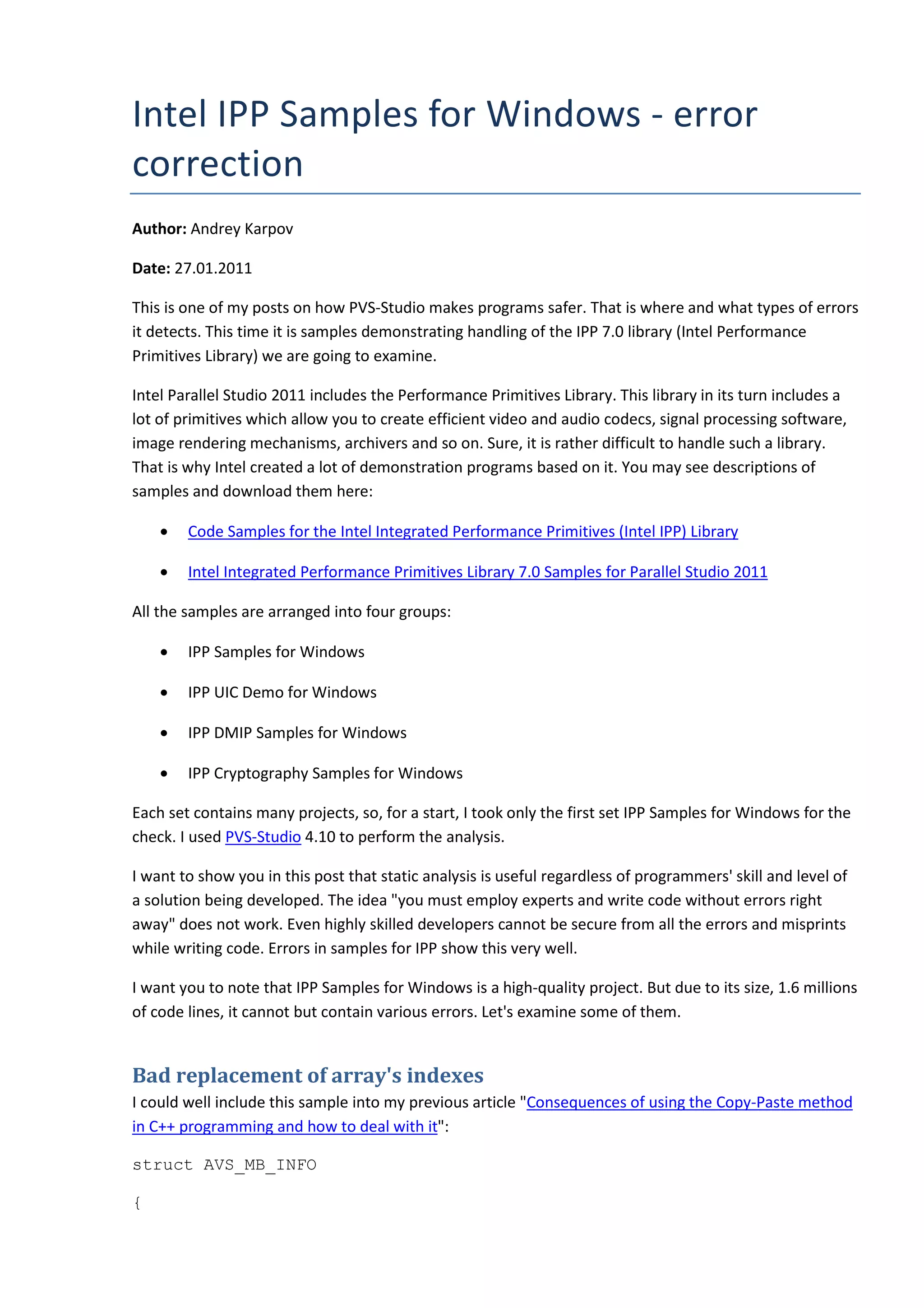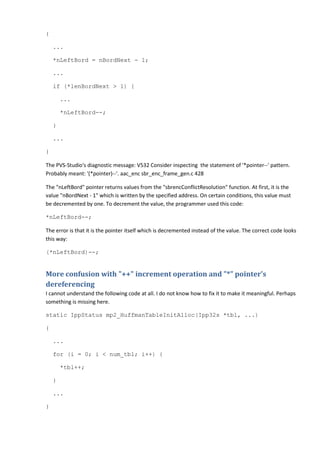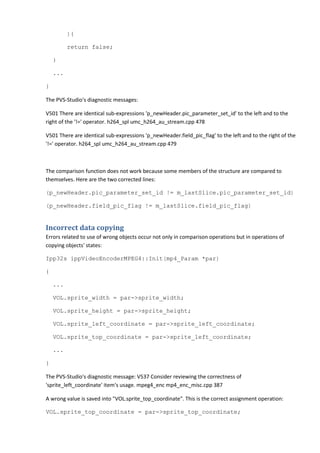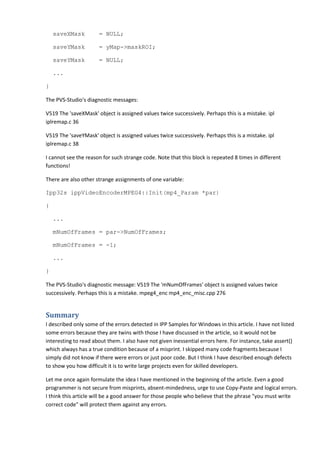The document discusses Intel's Performance Primitives (IPP) library and highlights common coding errors found in sample programs. Using static analysis from PVS-Studio, it showcases various types of errors including array overrun, identical code branches, and issues with pointer operations. The analysis emphasizes the importance of error detection irrespective of programmer skill and the prevalence of mistakes even in high-quality projects.

![...
Ipp8u refIdx[AVS_DIRECTIONS][4];
...
};
void AVSCompressor::GetRefIndiciesBSlice(void){
...
if (m_pMbInfo->predType[0] & predType)
{
m_refIdx[iRefNum] = m_pMbInfo->refIdx[dir][0];
iRefNum += 1;
}
if (m_pMbInfo->predType[1] & predType)
{
m_refIdx[iRefNum] = m_pMbInfo->refIdx[dir][1];
iRefNum += 1;
}
if (m_pMbInfo->predType[2] & predType)
{
m_refIdx[iRefNum] = m_pMbInfo->refIdx[dir][2];
iRefNum += 1;
}
if (m_pMbInfo->predType[3] & predType)
{
m_refIdx[iRefNum] = m_pMbInfo->refIdx[dir][30];
iRefNum += 1;
}
...
}](https://image.slidesharecdn.com/intelippsamples-130729074524-phpapp01/85/Intel-IPP-Samples-for-Windows-error-correction-2-320.jpg)
![The PVS-Studio's diagnostic message: V557 Array overrun is possible. The '30' index is pointing beyond
array bound. avs_enc umc_avs_enc_compressor_enc_b.cpp 495
The programmer copied the code fragment several times and changed the arrays' indexes. But in the
end his hand shook and he typed number 3 but forgot to delete 0. As a result, we have got index 30 and
there is an overrun far outside the array's boundaries.
Identical code branches
Since we started with code copying, let's examine one more example related to it:
AACStatus aacencGetFrame(...)
{
...
if (maxEn[0] > maxEn[1]) {
ics[1].num_window_groups = ics[0].num_window_groups;
for (g = 0; g < ics[0].num_window_groups; g++) {
ics[1].len_window_group[g] = ics[0].len_window_group[g];
}
} else {
ics[1].num_window_groups = ics[0].num_window_groups;
for (g = 0; g < ics[0].num_window_groups; g++) {
ics[1].len_window_group[g] = ics[0].len_window_group[g];
}
}
...
}
The PVS-Studio's diagnostic message: V523 The 'then' statement is equivalent to the 'else' statement.
aac_enc aac_enc_api_fp.c 1379
But this time it is just on the contrary - the programmer forgot to edit the copied code. The both
branches of the conditional operator "if" perform the same actions.
Confusion with priority of "--" decrement operation and "*" pointer's
dereferencing
static void
sbrencConflictResolution (..., Ipp32s *nLeftBord)](https://image.slidesharecdn.com/intelippsamples-130729074524-phpapp01/85/Intel-IPP-Samples-for-Windows-error-correction-3-320.jpg)

![The PVS-Studio's diagnostic message: V532 Consider inspecting the statement of '*pointer++' pattern.
Probably meant: '(*pointer)++'. mpeg2_dec umc_mpeg2_dec.cpp 59
Here, the loop from the sample above is equivalent to the following code:
tbl += num_tbl;
The PVS-Studio analyzer supposed that parentheses might be missing here and there must be this code:
"(*tbl)++;". But this variant is meaningless too. In this case, the loop is equivalent to this code:
*tbl += num_tbl;
So, this loop is a rather strange one. The error does exist but only the code's author seems to know how
to fix it.
Loss of error flag
The code has the function "GetTrackByPidOrCreateNew" that returns "-1" if an error occurs.
typedef signed int Ipp32s;
typedef unsigned int Ipp32u;
Ipp32s StreamParser::GetTrackByPidOrCreateNew(
Ipp32s iPid, bool *pIsNew)
{
...
else if (!pIsNew || m_uiTracks >= MAX_TRACK)
return -1;
...
}
The "GetTrackByPidOrCreateNew" function itself is absolutely correct. But an error occurs while using it:
Status StreamParser::GetNextData(MediaData *pData, Ipp32u *pTrack)
{
...
*pTrack = GetTrackByPidOrCreateNew(m_pPacket->iPid, NULL);
if (*pTrack >= 0 && TRACK_LPCM == m_pInfo[*pTrack]->m_Type)
ippsSwapBytes_16u_I((Ipp16u *)pData->GetDataPointer(),](https://image.slidesharecdn.com/intelippsamples-130729074524-phpapp01/85/Intel-IPP-Samples-for-Windows-error-correction-5-320.jpg)
![m_pPacket->uiSize / 2);
...
}
The PVS-Studio's diagnostic message: V547 Expression '* pTrack >= 0' is always true. Unsigned type
value is always >= 0. demuxer umc_stream_parser.cpp 179
The value returned by the "GetTrackByPidOrCreateNew" function is saved as the unsigned int type. It
means that "-1" turns into "4294967295". The "*pTrack >= 0" condition is always true.
As a result, if the "GetTrackByPidOrCreateNew" function returns "-1", an Access Violation will occur
while executing "m_pInfo[*pTrack]->m_Type".
Copy-Paste and missing +1
void H264SegmentDecoder::ResetDeblockingVariablesMBAFF()
{
...
if (GetMBFieldDecodingFlag(m_gmbinfo->mbs[m_CurMBAddr
- mb_width * 2]))
m_deblockingParams.nNeighbour[HORIZONTAL_DEBLOCKING] =
m_CurMBAddr - mb_width * 2;
else
m_deblockingParams.nNeighbour[HORIZONTAL_DEBLOCKING] =
m_CurMBAddr - mb_width * 2;
...
}
The PVS-Studio's diagnostic message: V523 The 'then' statement is equivalent to the 'else' statement.
h264_dec umc_h264_segment_decoder_deblocking_mbaff.cpp 340
If you look at the nearby code, you will understand that the programmer forgot to add 1 in the copied
line. This is the correct code:
if (GetMBFieldDecodingFlag(m_gmbinfo->mbs[m_CurMBAddr
- mb_width * 2]))
m_deblockingParams.nNeighbour[HORIZONTAL_DEBLOCKING] =
m_CurMBAddr - mb_width * 2;
else](https://image.slidesharecdn.com/intelippsamples-130729074524-phpapp01/85/Intel-IPP-Samples-for-Windows-error-correction-6-320.jpg)
![m_deblockingParams.nNeighbour[HORIZONTAL_DEBLOCKING] =
m_CurMBAddr - mb_width * 2 + 1;
Not far from this place, there is the same error with missing "+ 1" in the function
"H264CoreEncoder_ResetDeblockingVariablesMBAFF".
The PVS-Studio's diagnostic message: V523 The 'then' statement is equivalent to the 'else' statement.
h264_enc umc_h264_deblocking_mbaff_tmpl.cpp.h 366
Remove that does not remove anything
void H264ThreadGroup::RemoveThread(H264Thread * thread)
{
AutomaticUMCMutex guard(m_mGuard);
std::remove(m_threads.begin(), m_threads.end(), thread);
}
The PVS-Studio's diagnostic message: V530 The return value of function 'remove' is required to be
utilized. h264_dec umc_h264_thread.cpp 226
This is quite an interesting combination. On the one hand, everything is cool. We have mutex to
correctly remove items in a multithreaded application. On the other hand, the developers simply forgot
that the std::remove function does not remove items from the array but only rearranges them. Actually,
this code must look this way:
m_threads .erase(
std::remove(m_threads.begin(), m_threads.end(), thread),
m_threads.end());
Comparing structures' fields to themselves
I was looking through the errors and noticed that implementation of the H264 video compression
standard is somewhat defective. A lot of errors we have found relate to this very project. For instance,
the programmer was in a hurry and used two wrong variable names at once.
bool H264_AU_Stream::IsPictureSame(H264SliceHeaderParse & p_newHeader)
{
if ((p_newHeader.frame_num != m_lastSlice.frame_num) ||
(p_newHeader.pic_parameter_set_id !=
p_newHeader.pic_parameter_set_id) ||
(p_newHeader.field_pic_flag != p_newHeader.field_pic_flag) ||
(p_newHeader.bottom_field_flag != m_lastSlice.bottom_field_flag)](https://image.slidesharecdn.com/intelippsamples-130729074524-phpapp01/85/Intel-IPP-Samples-for-Windows-error-correction-7-320.jpg)

![Two loops for one variable
JERRCODE CJPEGDecoder::DecodeScanBaselineNI(void)
{
...
for(c = 0; c < m_scan_ncomps; c++)
{
block = m_block_buffer + (DCTSIZE2*m_nblock*(j+(i*m_numxMCU)));
// skip any relevant components
for(c = 0; c < m_ccomp[m_curr_comp_no].m_comp_no; c++)
{
block += (DCTSIZE2*m_ccomp[c].m_nblocks);
}
...
}
The PVS-Studio's diagnostic message: V535 The variable 'c' is being used for this loop and for the outer
loop. jpegcodec jpegdec.cpp 4652
One variable 'c' is used for two loops nested in each other. A decoding function like this may cause
strange and unpredicted results.
Double assignment for additional safety
H264EncoderFrameType*
H264ENC_MAKE_NAME(H264EncoderFrameList_findOldestToEncode)(...)
{
...
MaxBrefPOC =
H264ENC_MAKE_NAME(H264EncoderFrame_PicOrderCnt)(pCurr, 0, 3);
MaxBrefPOC =
H264ENC_MAKE_NAME(H264EncoderFrame_PicOrderCnt)(pCurr, 0, 3);
...
}](https://image.slidesharecdn.com/intelippsamples-130729074524-phpapp01/85/Intel-IPP-Samples-for-Windows-error-correction-9-320.jpg)
![The PVS-Studio's diagnostic message: V519 The 'MaxBrefPOC' object is assigned values twice
successively. Perhaps this is a mistake. h264_enc umc_h264_enc_cpb_tmpl.cpp.h 784
When I saw this code, I recalled an old programmers' joke:
- Why do you have two identical GOTO one right after the other in your code?
- What if the first one doesn't work!
Well, this error is not crucial yet it is an error.
Code making you alert
AACStatus sbrencResampler_v2_32f(Ipp32f* pSrc, Ipp32f* pDst)
{
...
k = nCoef-1;
k = nCoef;
...
}
The PVS-Studio's diagnostic message: V519 The 'k' object is assigned values twice successively. Perhaps
this is a mistake. aac_enc sbr_enc_resampler_fp.c 90
This double assignment alerts me much more than in the previous sample. It seems as if the
programmer was not confident. Or as if he decided to try "nCoef-1" first and then "nCoef". It is also
called "programming through experiment method". Anyway, it is that very case when you should stop
for a while and think it over on encountering such a fragment.
Minimum value which is not quite minimum
void MeBase::MakeVlcTableDecision()
{
...
Ipp32s BestMV= IPP_MIN(IPP_MIN(m_cur.MvRate[0],m_cur.MvRate[1]),
IPP_MIN(m_cur.MvRate[2],m_cur.MvRate[3]));
Ipp32s BestAC= IPP_MIN(IPP_MIN(m_cur.AcRate[0],m_cur.AcRate[1]),
IPP_MIN(m_cur.AcRate[2],m_cur.AcRate[2]));
...
}](https://image.slidesharecdn.com/intelippsamples-130729074524-phpapp01/85/Intel-IPP-Samples-for-Windows-error-correction-10-320.jpg)
![The PVS-Studio's diagnostic message: V501 There are identical sub-expressions to the left and to the
right of the '<' operator: (m_cur.AcRate [2]) < (m_cur.AcRate [2]) me umc_me.cpp 898
Here is another misprint in the array's index. The last index must be 3, not 2. This is the correct code:
Ipp32s BestAC= IPP_MIN(IPP_MIN(m_cur.AcRate[0],m_cur.AcRate[1]),
IPP_MIN(m_cur.AcRate[2],m_cur.AcRate[3]));
What is unpleasant about such errors is that the code "almost works". The error occurs only if the
minimum item is stored in "m_cur.AcRate[3]". Such errors like to hide during testing and show up on
users' computers at user input data.
Maximum value which is not quite maximum
There are problems with maximum values too:
Ipp32s ippVideoEncoderMPEG4::Init(mp4_Param *par)
{
...
i = IPP_MAX(mBVOPsearchHorBack, mBVOPsearchHorBack);
...
}
The PVS-Studio's diagnostic message: V501 There are identical sub-expressions '(mBVOPsearchHorBack)'
to the left and to the right of the '>' operator. mpeg4_enc mp4_enc_misc.cpp 547
The mBVOPsearchHorBack variable is used twice. Actually, the programmer intended to use
mBVOPsearchHorBack and mBVOPsearchVerBack:
i = IPP_MAX(mBVOPsearchHorBack, mBVOPsearchVerBack);
A bad shot
typedef struct
{
...
VM_ALIGN16_DECL(Ipp32f)
nb_short[2][3][__ALIGNED(MAX_PPT_SHORT)];
...
} mpaPsychoacousticBlock;
static void mp3encPsy_short_window(...)](https://image.slidesharecdn.com/intelippsamples-130729074524-phpapp01/85/Intel-IPP-Samples-for-Windows-error-correction-11-320.jpg)
![{
...
if (win_counter == 0) {
nb_s = pBlock->nb_short[0][3];
}
...
}
The PVS-Studio's diagnostic message: V557 Array overrun is possible. The '3' index is pointing beyond
array bound. mp3_enc mp3enc_psychoacoustic_fp.c 726
There must be a simple misprint here. It is index '3' used accidentally instead of '2'. I think you
understand the consequences.
Error causing a slowdown
void lNormalizeVector_32f_P3IM(Ipp32f *vec[3], Ipp32s* mask,
Ipp32s len) {
Ipp32s i;
Ipp32f norm;
for(i=0; i<len; i++) {
if(mask<0) continue;
norm = 1.0f/sqrt(vec[0][i]*vec[0][i]+
vec[1][i]*vec[1][i]+
vec[2][i]*vec[2][i]);
vec[0][i] *= norm; vec[1][i] *= norm; vec[2][i] *= norm;
}
}
The PVS-Studio's diagnostic message: V503 This is a nonsensical comparison: pointer < 0. ipprsample
ippr_sample.cpp 501
This is a nice example of code that works slower than it could due to an error. The algorithm must
normalize only those items which are specified in the mask array. But this code normalizes all the items.
The error is located in the "if(mask<0)" condition. The programmer forgot to use the "i" index. The
"mask" pointer will be almost all the time above or equal to zero and therefore we will process all the
items.](https://image.slidesharecdn.com/intelippsamples-130729074524-phpapp01/85/Intel-IPP-Samples-for-Windows-error-correction-12-320.jpg)
![This is the correct code:
if(mask[i]<0) continue;
Subtraction result always amounts to 0
int ec_fb_GetSubbandNum(void *stat)
{
_fbECState *state=(_fbECState *)stat;
return (state->freq-state->freq);
}
The PVS-Studio's diagnostic message: V501 There are identical sub-expressions to the left and to the
right of the '-' operator: state->freq - state->freq speech ec_fb.c 250
A misprint here causes the function to return 0 all the time. We are subtracting something wrong here. I
do not know what it actually must be.
Incorrect processing of buffer overflow
typedef unsigned int Ipp32u;
UMC::Status Init(..., Ipp32u memSize, ...)
{
...
memSize -= UMC::align_value<Ipp32u>(m_nFrames*sizeof(Frame));
if(memSize < 0)
return UMC::UMC_ERR_NOT_ENOUGH_BUFFER;
...
}
The PVS-Studio's diagnostic message: V547 Expression 'memSize < 0' is always false. Unsigned type
value is never < 0. vc1_enc umc_vc1_enc_planes.h 200
Processing of situation when the buffer's size is not sufficient is implemented incorrectly. The program
will continue working instead of returning the error's code and most likely will crash. The point is that
the "memSize" variable has the "unsigned int" type. So, the "memSize < 0" condition is always false and
we go on working with a buffer overflow.
I think it is a good example of software attack vulnerability. You may cause a buffer overflow by feeding
incorrect data into the program and use it for your own purposes. By the way, we found about 10 such
vulnerabilities in the code. I will not describe them here not to overload the text.](https://image.slidesharecdn.com/intelippsamples-130729074524-phpapp01/85/Intel-IPP-Samples-for-Windows-error-correction-13-320.jpg)
![Overrun in the wake of incorrect check
Ipp32u m_iCurrMBIndex;
VC1EncoderMBInfo* VC1EncoderMBs::GetPevMBInfo(Ipp32s x, Ipp32s y)
{
Ipp32s row = (y>0)? m_iPrevRowIndex:m_iCurrRowIndex;
return ((m_iCurrMBIndex - x <0 || row <0)? 0 :
&m_MBInfo[row][m_iCurrMBIndex - x]);
}
The PVS-Studio's diagnostic message: V547 Expression 'm_iCurrMBIndex - x < 0' is always false.
Unsigned type value is never < 0. vc1_enc umc_vc1_enc_mb.cpp 188
The "m_iCurrMBIndex" variable has the "unsigned" type. Because of it, the "m_iCurrMBIndex - x"
expression also has the "unsigned" type. Therefore, the "m_iCurrMBIndex - x < 0" condition is always
false. Let's see what consequences it has.
Let the "m_iCurrMBIndex" variable amount to 5 and "x" variable amount to 10.
The "m_iCurrMBIndex - x" expression equals 5u - 10i = 0xFFFFFFFBu.
The "m_iCurrMBIndex - x < 0" condition is false.
The "m_MBInfo[row][0xFFFFFFFBu]" expression is executed and an overrun occurs.
Error of using '?:' ternary operator
The ternary operator is rather dangerous because you may easily make an error using it. Nevertheless,
programmers like to write code as short as possible and use the interesting language construct. The C++
language punishes them for this.
vm_file* vm_file_fopen(...)
{
...
mds[3] = FILE_ATTRIBUTE_NORMAL |
(islog == 0) ? 0 : FILE_FLAG_NO_BUFFERING;
...
}
The PVS-Studio's diagnostic message: V502 Perhaps the '?:' operator works in a different way than it was
expected. The '?:' operator has a lower priority than the '|' operator. vm vm_file_win.c 393
There must be a combination of flags FILE_ATTRIBUTE_NORMAL and FILE_FLAG_NO_BUFFERING. But
actually, the "mds[3]" item is always assigned 0.](https://image.slidesharecdn.com/intelippsamples-130729074524-phpapp01/85/Intel-IPP-Samples-for-Windows-error-correction-14-320.jpg)
![The programmer forgot that the priority of "|" operator is higher than that of "?:" operator. So it turns
out that we have the following expression in the code (note the parentheses):
(FILE_ATTRIBUTE_NORMAL | (islog == 0)) ?
0 : FILE_FLAG_NO_BUFFERING;
The "FILE_ATTRIBUTE_NORMAL | (islog == 0)" condition is always true and we assign 0 to "mds[3]" item.
This is the correct expression (note the parentheses once again):
FILE_ATTRIBUTE_NORMAL |
((islog == 0) ? 0 : FILE_FLAG_NO_BUFFERING);
Strange handling of array
AACStatus alsdecGetFrame(...)
{
...
for (i = 0; i < num; i++) {
...
*tmpPtr = (Ipp32s)((tmp << 24) + ((tmp & 0xff00) << 8) +
((tmp >> 8) & 0xff00) + (tmp >> 24));
*tmpPtr = *srcPrt;
...
}
...
}
The PVS-Studio's diagnostic message: V519 The '* tmpPtr' object is assigned values twice successively.
Perhaps this is a mistake. aac_dec als_dec_api.c 928
I suggest that the readers examine the code themselves and draw conclusions. I would just call this code
"peculiar".
Paranormal assignments
static
IPLStatus ownRemap8u_Pixel(...) {
...
saveXMask = xMap->maskROI;](https://image.slidesharecdn.com/intelippsamples-130729074524-phpapp01/85/Intel-IPP-Samples-for-Windows-error-correction-15-320.jpg)

